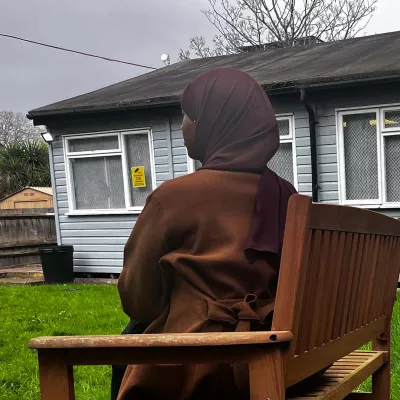In early 2020, Finland’s Prime Minister Sanna Marin announced she was bringing in four-day working weeks and six-hour days, pretty much making it the dream place to live. But that’s not the only thing that makes the country idyllic – in the last couple of years, it seems they have managed to find a home for nearly everyone to live in the country, near on eradicating their homelessness issue.
In the UK, the opposite is the reality we’re currently living in, with homelessness numbers skyrocketing. As we try to return to normal, coronavirus support is seemingly coming to an end for a lot of people, including our rough sleepers. The number of homeless people currently stands at roughly 320,000 in the UK, 135,000 of those being homeless young people. In fact, we discovered that over Christmas 2018 alone, 22,000 young people visited their council for support because they were homeless or at risk of losing a home.
Finland, however, boast a surprisingly low number of homeless: in the late 80s, they had around 18,000 people without a home across the country, but figures from 2017 show the government had reduced that number to 6,600 people - the number today is thought to be around 5,500.
So how do they do it? It’s simple: they give people a home as soon as they need one. There’s no strings attached – if they are drinkers or drug takers, that’s ok. Much like Centrepoint’s M.O., their government provides people who are struggling with the support they need, whether it’s guiding them through addiction issues, opening them up to new skills, assisting them into education or work, or helping with crucial welfare paperwork.
And the formerly homeless residents pay rent just like everyone else: they have a rental contract that’s paid from their own pocket, or using the relatively generous benefits provided by the state.
For the last 30 years, tackling homelessness has been a huge focus for the Finnish government. In 2007 they began building their homelessness policies around the ‘Housing First’ ethos: give rough sleepers a home that’s permanent and stable, as quickly as possible.
The policy works by getting rid of homelessness shelters – taking short-term accommodation such as night shelters and hostels and transforming them into flats; a Salvation Army shelter, for example, was transformed from a 250-bed emergency accommodation into a supported housing unit with 81 apartments.
This transformation was down to a vital change in attitudes towards homeless people: now, Finland’s approach is to view homelessness as “a housing problem and a violation of fundamental rights, both solvable, and not as an inevitable social problem resulting from personal issues.”
It acknowledges the fact that shaking addiction is highly unlikely when you’re on the streets or in short-term, precarious accommodation. It also places emphasis on the core value that Centrepoint holds so dear: give people the opportunity to embrace a job and a home. One usually can’t happen without the other and like us, the Finnish government place a precedence over ensuring that, once vulnerable people are in a home, they are then given the tools – from tackling addiction to addressing mental health issues – to succeed and thrive from that point.
The UK is now trying to follow Finland’s example – in 2014 a small Housing First trial was set up, yielding positive results. In 2018, the government were provided with £28 million in funding for three Housing First pilots in Liverpool, Manchester and the West Midlands. And the first youth-specific Housing First model is currently in place in Edinburgh. So will it work with a nation-wide rollout? That remains to be seen: Finland added Housing First to their homelessness strategy because it looked like it would beneficial, and it was – but they had a pretty effective strategy in place before this, too.
In order for it to work in the UK, it needs constant funding, and a generous supply of housing that is both affordable and adequate. We stated at the beginning of the election period in late 2019 that the next UK government needs to put homelessness at the forefront of their agenda – as our Research and Policy Officer Billy Harding said in our previous blog post, 'Homes for the Future': “for those at the sharpest end of the housing crisis, this shortage of options means not having a place to call home at all. At Centrepoint, we see how a lack of genuinely affordable housing impacts on vulnerable young people, as it becomes ever more difficult to find an affordable place to live.”
Centrepoint has been piloting its own housing first project in north London over the past year. However, the project has run into wider challenges due to a critical lack of affordable housing for young people. We are working closely with the local authority to secure housing, but our experience shows the difficulties of trying to deliver housing first without access to secure housing options for young people.
In 2020, the need for a Housing First model has never been more pertinent. Since the UK went into lockdown in March, the majority of rough sleepers have been sheltered in hotels. But as the economy tries to recuperate, these hotels are preparing to return to business as usual, and so most of the people currently occupying their rooms are likely to end up exactly where they started – back out on the streets. Despite the hard work of homelessness charities, it has been hard to secure accommodation for these people post-lockdown, and the UK homelessness problem is only set to get worse, with many people in precarious employment now left without jobs and forced to sleep rough. The UK is at a crucial stage where it could really benefit from a Housing First model.
There needs to be a more comprehensive understanding of how homelessness occurs, and a change of mindset which puts people’s human rights above the reasons they are without a home in the first place. We need to take a leaf out of Finland’s ever-strong book, building on our existing knowledge of homelessness, to ensure that in years to come, charities like ours are no longer needed.




 Tamsin Clements
Tamsin Clements

